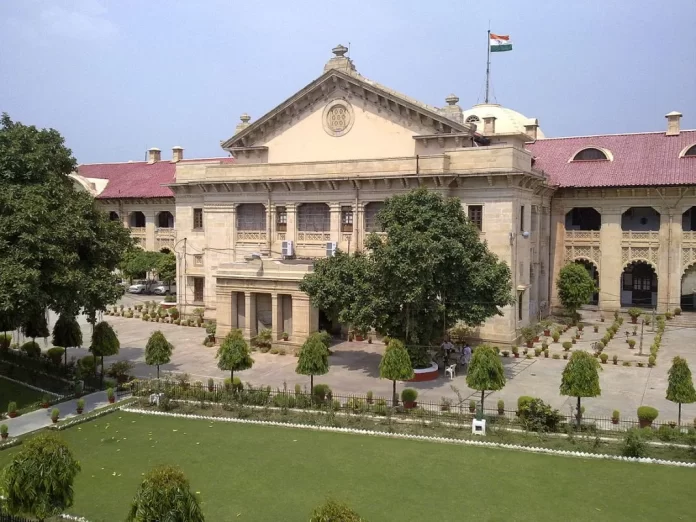In an FIR lodged against former Uttar Pradesh Shia Central Waqf Board chairman, Wasim Rizvi (Jitendra Tyagi) for allegedly making derogatory remarks against the adorable personalities of the Sunni Sect of the Muslim community in his film Ram Ki Janmabhoomi, the Allahabad High Court has granted relief to Wasim Rizvi.
A Single Bench of Justice Rahul Chaturvedi passed this order while hearing an application under section 482 filed by Syed Waseem Rizvi.
The extra-ordinary power of the Court under section 482 Cr.P.C has been invoked by the applicant with the prayer to quash the entire proceeding of Criminal Case Police Station-Chowk, District-Lucknow pending in the court of the Additional Chief Judicial Magistrate-III, Lucknow under section 153-A and 504 IPC and to quash the summoning order dated 21.01.2023 passed by the Additional Chief Judicial Magistrate-V, Lucknow in case as well as charge sheet dated 07.01.2023, under section 153-A and 504 IPC.
The prosecution against the applicant started rolling after filing of a FIR by one Abdul Fahid Farooqui against the applicant-Syed Waseem Rizvi, the then Chairman, Shia Waqf Board. The allegations made in the FIR is that the informant is the Chairman of Sahaba Action Committee which is involved in the upliftment of social and educational standards of Sunni Sect of Muslim community.
On 19.11.2018, a trailer was shown to the informant titled as “Ram Janmabhoomi” and the said trailer was subsequently played on Youtube channels, a digital platform.
It is alleged that in that trailer, certain imputations and derogatory remarks were made against the adorable personalities of Sunni Sect causing hurt to the informant also.
As per the allegations made in the FIR, the informant is of the view that the screening of the film may lead to communal tension in the city.
The applicant was said to be the writer and producer of that film. Needless to mention here that by that time, proper certification of the film was not done by the Central Board of Film Certification, Mumbai. Therefore, it was urged that suitable action shall be taken under section 153, 153-A, 504, 505 and the Cinematography Act, 1952.
After holding an in-depth probe into the matter, police submitted the charge sheet/report under section 173(2) Cr.P.C on 07.01.2023. It is further argued by the counsel for the applicant that the Magistrate in a most mechanical fashion, has taken cognizance of the offence under section 153-A and 504 IPC without assigning any good reason for the same.
Thereafter, the informant of the case has parallely filed Misc Writ Bench, titled as ‘Abdul Waheed Farooqui Vs U.O.I and others’ before Division Bench of the Court and the Court in its lengthy judgment, considering all the aspect of the issue, dismissed the petition with the observation that the petition is being filed to gain cheap popularity among masses.
Since, by that time, the applicant had not received proper certification with regard to film but on 14.03.2013, the Central Board of Film Certification has granted ‘A/UA’ certificate to that film.
Counsel for the applicant stated that despite the fact that the applicant has received proper certification from the competent Board on one hand and the Government of Uttar Pradesh has sanctioned the prosecution case against the applicant on 31.12.2022 as contemplated under section 196 of the CrPC.
Counsel for the applicant has further drawn the attention of the Court to the two judgments of the Apex Court in the case of Salman Khan Vs State of Gujarat and others reported in 2018 SCC Online SC 3758 and 2019 SCC Online SC 2144 in which the Apex Court have categorically opined that as soon as the Central Board of Film Certification provides the producer to entitle to screen his film then under that circumstances, no “lis” remain to be adjudicated by the competent concerned court.
After perusing the aforesaid judgment, it seems that no case against the applicant is made out. But the Court is also conscious of the fact that there is a scheme provided in the Code of Criminal Procedure and the Court consciously is not inclined to break that scheme, the Court observed.
Thus, the Court directed that the applicant shall appear before the court concerned armed with an application under section 88 of the CrPC which reads thus:-
“When any person for whose appearance or arrest the officer presiding in any Court is empowered to issue a summons or warrant, is present in such Court, such officer may require such person to execute a bond, with or without sureties, for his appearance in such Court, or any other Court to which the case may be transferred for trial.”
“The concerned court, after taking personal bond, may release the applicant with or without surety and thereafter, the applicant shall move detailed discharge application under the appropriate sections of CrPC raising all the legal as well as factual points for the determination of the same by the court concerned and it is mandatory and obligatory on the part of the court concerned to decide the same within a period of six weeks from its institution by giving a well reasoned order”, the order reads.
With the aforesaid observations, the Court disposed of the application.


